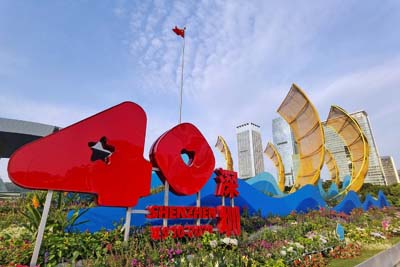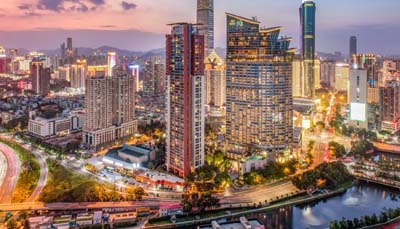
Commentary: How openness and cooperation turned Shenzhen from a tiny backwater into a global metropolis
Wang Lei
As China’s Shenzhen Special Economic Zone embraces its 40th birthday this year amid a raging coronavirus pandemic, a bleeding global economy and profound global transformations rarely seen in a century, decoding the secret formula of the rapid rise of a small Chinese fishing village bears a special global significance.
In just four decades, Shenzhen has grown into a glittering metropolis that hosts a population of over 13 million and more than 30,000 tech firms, and runs an economy worth roughly 400 billion U.S. dollars. Its metamorphosis stands as an epitome of China’s miraculous development and an illustration of the country’s decades-long practice to expand opening up and intensify its links with the rest of the world community.

The world today truly stands at a critical juncture. The confluence of protectionism, isolationism and economic nationalism is undermining the global drive to beat the deadly pathogen and threatening to prolong an agonizing global recession.
While the Chinese city’s success owes to an array of key and inter-related factors, like the strong leadership of the Communist Party of China, maintaining a development path suitable to a country’s own conditions, as well as the courage to pull off tough but necessary reforms, it is indeed meaningful today to highlight the importance of maintaining the spirit of openness and cooperation in today’s world of rising uncertainties.
China is not the world’s only beneficiary and builder of an increasingly interconnected global village. Over the past few decades, with the dynamic trans-border flow of capital and talent worldwide, technological breakthroughs have become almost magical, international cooperation has flourished, and the global economy and trade have witnessed geometrical growth.
Based on the current value of the U.S. dollars, the total global gross domestic product (GDP) rose from 1.37 trillion in 1960 to 87.7 trillion in 2019, figures from the World Bank show, and global trade to GDP increased from 26.7 percent to 60.4 percent.
To crush the deadly virus, pull the world out of recession and chart a future course of development, countries across the globe should stay committed to opening up, uphold multilateral trade with the World Trade Organization as the cornerstone, and work together to ensure reliable and productive global supply chains.
Economic globalization is not a choice, but a fact. And it will remain the wave of the future. The idea of de-coupling or retreating into one’s own borders is as damaging as it is impossible.
Countries must jointly invigorate economic globalization and make it more inclusive and sustainable, instead of erecting walls of protectionism and isolationism. Any deliberate attempt to sever ties or disrupt international cooperation and exchanges is not in anyone’s interests and doomed to fail.
In a grand gathering to commemorate Shenzhen’s 40th birthday on Wednesday, Chinese President Xi Jinping called on the city to expand all-round opening up, and said China welcomes foreign countries to participate more in the reform, opening up and development of China’s special economic zones.
History has proved that opening-up and cooperation, instead of isolation or confrontation, can lead to progress and prosperity in a closely interconnected community. Looking into the future, China, a staunch supporter of globalization, will, as always, continue to join the rest of the world to weather shared challenges and achieve common prosperity.
